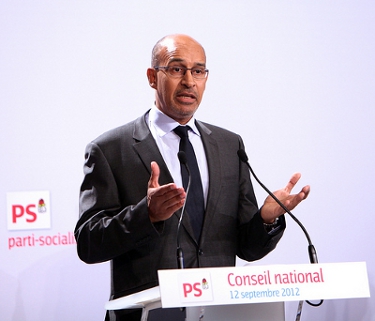 Last week Harlem Désir was officially nominated to replace Martine Aubry as first secretary of the French Socialist Party. If, as expected, the nomination is endorsed at the party’s annual conference next month, he will become the first black leader of a major European political party. Nabila Ramdani argues that while the milestone may be celebrated, the appointment will do little for race relations within the country. The promotion of ethnic minority politicians achieves nothing if the communities from which these individuals have emerged are consistently ignored.
Last week Harlem Désir was officially nominated to replace Martine Aubry as first secretary of the French Socialist Party. If, as expected, the nomination is endorsed at the party’s annual conference next month, he will become the first black leader of a major European political party. Nabila Ramdani argues that while the milestone may be celebrated, the appointment will do little for race relations within the country. The promotion of ethnic minority politicians achieves nothing if the communities from which these individuals have emerged are consistently ignored.
How convenient for Europe’s increasingly vocal far-right that the continent’s probable first black political leader has a criminal conviction. France’s Front National (FN) was delighted to describe Harlem Désir as an “ex-convict” when he was named as the official candidate to replace Martine Aubry as leader of the country’s governing Socialist party (PS) on 13 September.

They were referring, with obvious glee, to the suspended 18-month sentence and 30,000-franc fine handed down to 52-year-old Désir in 1998 for accepting an illegal payment from an organisation providing professional training to immigrants. Funding scandals among public figures are depressingly common in France nowadays. Jacques Chirac, president until 2007, was convicted of fraud last year, while the former prime minister Dominique de Villepin found himself in police custody this week facing a similar allegation. Nicolas Sarkozy, who stepped down as president this year, is under investigation for allegedly accepting huge amounts of cash from Liliane Bettencourt, the L’Oréal heiress, in return for tax breaks.
The difference, of course, is that the crimes of white, entitled politicians are seen as par for the course among France’s notoriously corrupt governing class, while the past misdemeanors of a black man from immigrant stock are trumpeted from the rooftops. How, asks the Front National, can a man who changed his name from Jean-Philippe to Harlem in homage to radical African-American political leaders be a true Frenchman? How can the son of a West Indian father and a Jewish mother take over a position traditionally occupied by future French presidents, including the Socialist legend François Mitterrand and the incumbent, François Hollande?
Désir, who is almost certain to be named first secretary of the PS at the annual party conference in October, may be delighted by such criticism from the FN, but there are numerous opponents within his own party who are also fierce critics. Rather than a future leader who will emerge as a Gallic Obama, they view Désir as a very average administrator who is being propelled to high office for reasons of political correctness alone.
In a country that did not even have a black national newsreader until 2004, non-white faces remain few and far between in all corners of public life, not least in politics. The secular republic is officially colour-blind, but everything from the national assembly and the boardrooms of its top companies to prime-time chat shows are noticeably devoid of people from African or Caribbean backgrounds and other ethnic minorities. Official reports regularly highlight the fact that some 15 per cent of the population are of non-European origin. It is these 5 million people that Ms Aubry and the prime minister, Jean-Marc Ayrault, had in mind when they instructed 175,000 PS members to endorse Désir as their leader next month.
Désir’s expected shoo-in does not mean that racial minorities have moved up the socio-economic ladder: the vast majority still live in deprived out-of-town housing estates. This was just one of the reasons Désir started his career in the 1980s as a revolutionary Trotskyite and hardline anti-racism campaigner. Like so many other young idealists who find themselves having to work within established political parties – he set up his own in the 1990s before joining the PS – Désir has changed, but France has not. As Sarkozy did before him, President Hollande is presiding over a party that wants to promote ethnic minorities by appointing selected individuals, while ignoring the communities from which they come. In the same way that Rachida Dati, a conservative from a north African immigrant background, was ridiculously over-promoted by Sarkozy to become justice minister, so Désir, who is not even an MP, will find himself woefully out of his depth as first secretary of a party that dominates both houses of parliament and councils nationwide .
Désir’s appointment will do nothing to address the chronic problems of prejudice and economic underachievement that members of ethnic minorities have to deal with day in, day out. His nomination is an act of heavy-handed, cynical politicking, which says everything about the state of race relations in modern France.
This article first appeared at the Guardian.
Please read our comments policy before commenting.
Note: This article gives the views of the author, and not the position of EUROPP – European Politics and Policy, nor of the London School of Economics.
Shortened URL for this post: http://bit.ly/QmJZAk
_________________________________
 Nabila Ramdani – LSE International History
Nabila Ramdani – LSE International History
Nabila Ramdani is a PhD candidate in the Department of International History at the London School of Economics and Political Science. As a freelance journalist she has written extensively in a number of publications on European and French politics. She tweets at @NabilaRamdani.



1 Comments